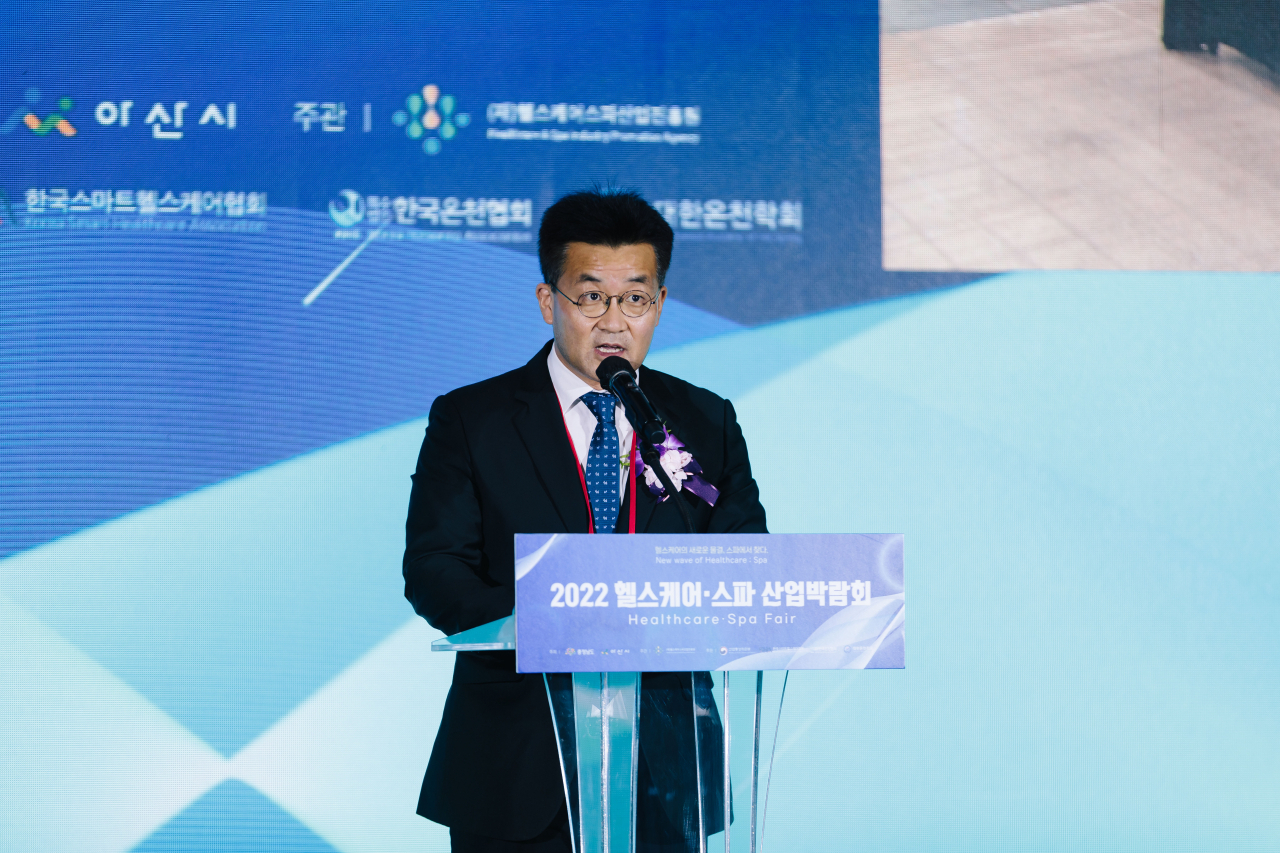[K-Wellness] Toward a new view of spa retreats and treatments
The Healthcare & Spa Industry Promotion Agency, the only specialized spa-related institution in Korea
By Korea HeraldPublished : Jan. 17, 2023 - 10:03

The Healthcare & Spa Industry Promotion Agency (HESPA) located in Asan, South Chungcheong Province, is reaching new heights for the rehabilitation health care industry using spas. In particular, it is the only spa-related institution in Korea paving the way for the bio-health industry as a future growth engine.
Asan is a leading hot springs city in Korea, renowned for its long history and tradition. According to Statistics Korea, South Chungcheong Province ranked second in the nation in terms of production in the rehabilitation health care industry in 2017 at 18 trillion won ($14 billion).
Against this backdrop, the HESPA began diversifying the rehabilitation health care industry by combining spa resources and the bio-health industry. In particular, it revealed plans to implement strategic businesses for the future ideals of the Fourth Industrial Revolution and the post-COVID-19 era.
“Economic uncertainty continues to grow and the industrial ecosystem is undergoing a rapid change. Therefore, we will take on the challenge of facilitating the growth of the combined spa and bio-health care industry, a high value-added industry for the future,” said HESPA Director Kim Chang-yong. He also expressed strong aspirations to establish the HESPA as a leading innovative institution in the region for revitalizing the local economy and developing the national industry.
On Nov. 1, the HESPA entered into a business agreement with Sangmyung University for joint research on spa-related health care. The two organizations will provide spa-related health care education; field training for students; and develop and operate internship programs. In addition, they joined forces to jointly operate research and development projects with the central and local governments; find areas of cooperation in the field of combined spa-related health care; and build up a network. They also announced their plan to work together to jointly use each other's R&D facilities and equipment.
Could you share the history of Korean hot springs with us, predominantly focusing on Asan?
In Asan, there are many hot springs — including Onyang, Dogo, Asan and Chungmu — which are ranked among the top 10 in the country. In particular, the Onyang hot spring is known as the oldest hot spring in Korean literature. According to records, the Onyang hot spring has been used since the Baekje period. In the first month of the 15th year of his reign in 1443, King Sejong the Great visited Onyang to treat eye disease. Numerous remains show that since then, many kings built temporary palaces and stayed there for recreation or to treat diseases.
What effect does a spa have on our health?
The physical, chemical and pharmacological effects of hot spring water components have been demonstrated to have therapeutic and recuperative effects. To be more specific, it delivers excellent effects in stimulating blood circulation through warm baths, and helps excrete lactic acid and control weight. Lukewarm water helps relieve tension in the mind and body by relieving muscles and stress. In particular, the alkaline hot spring water is good for the skin and possesses anti-aging effects. The buoyancy of the water can also help senior citizens exercise, strengthening their muscles and relieving pain.
How do you forecast the spa industry's impact on revitalizing the local economy?
The HESPA is the only specialized spa promotion agency in Korea. Asan has a high proportion of manufacturing industries at over 70 percent, but this has continuously and gradually declined. Therefore, it is time to reinforce support for small and medium-sized enterprises. Since the spa and rehabilitation health care industries are closely associated with each other, they are suitable as a unique industrial development strategy for Asan. Going forward, we will make the most of the region’s fertile hot spring resources and advanced industrial facilities. In particular, we plan to build a platform associated with hot springs and related companies. In addition, we will load up on inspections, analysis, and evaluation equipment needed for the development and commercialization of hot spring products. We will also provide full support for marketing activities. Ultimately, we will play a pivotal role in helping to develop Asan into a hot spring industry hub.
What do you require from the central and local governments to promote the spa industry?
Asan attracts the largest number of hot spring tourists in the country. To its advantage, it is a city of natural hot springs historically enjoyed by kings. It also has a powerful image as a city of renowned hot springs in Korea. Certainly, the city is going through challenging times due to aging facilities, changes in tourism trends, recession of the surrounding commercial districts and large idle spaces. To overcome this crisis and promote the hot spring industry, an innovative approach is required. We need to deviate from the past form of hot springs oriented toward bathing, and develop a novel approach to healing and treatment. To this end, we should come up with a wide variety of projects. The government's support and efforts are urgently needed to conduct research on the medical efficacy of hot springs on specific diseases; secure a desirable budget for R&D projects; provide health insurance coverage; revise the laws related to the drinking of hot spring water; and form a consultative body to fully revitalize hot spring cities.
By Yang Jung-won (7toy@heraldcorp.com)
-
Articles by Korea Herald




















![[Today’s K-pop] BTS pop-up event to come to Seoul](http://res.heraldm.com/phpwas/restmb_idxmake.php?idx=642&simg=/content/image/2024/04/17/20240417050734_0.jpg&u=)